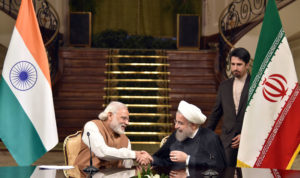When Prime Minister Narendra Modi set aside protocol to receive Jordanian King Abdullah II late last evening at Delhi airport he not only sent an important message to Canadian President Justine Trudeau, who was received by an unknown junior minister when he landed in Delhi, but also to the Iranian President Hassan Rouhani.

King Abdullah II, who is on a 3-day tour will address a gathering of Islamic scholars, intellectuals and many others at Delhi’s convention centre, Vigyan Bhavan. The event is organized by India’s Islamic Cultural Centre and would be attended by PM Modi. Why the difference?
It may have something to do with the type of Islam King Abdullah, has been campaigning hard to project: the moderate face of Islam as practised in India. He will speak on “Islamic Heritage- promoting understanding and moderation”.
Interestingly, this privilege to speak from the pulpit of the Islamic Cultural Centre, it is learnt, was denied to Iranian President Hassan Rouhani who intriguingly began his trip from Hyderabad and not from National capital, New Delhi. It is learnt that the Indian authorities did not want the Iranian President to use the forum to attack close allies like the United States and Israel. Instead, he was offered to begin his trip from Hyderabad, which has old ties with Iran. In fact, the Qutb Shahi dynasty that ruled Hyderabad in the 17th century was known to have Persian origin. This was Rouhani’s second visit to the city.
Despite Modi government’s reservations about the Iranian President’s views on the US, what is really clear is that Delhi is positioning itself as a mediator in the Middle East.
President Rouhani gave a sober speech without really bashing the US. Instead, he used an interaction organised by Observer Research Foundation as a forum to mount a scathing attack on US President Trump and how he was going back on an agreement in which other countries were also signatories.
Despite Modi government’s reservations about the Iranian President’s views on the US, what is really clear is that Delhi is positioning itself as a mediator in the Middle East. With Prime Minister Modi engaging with Iran, Israel, UAE, Saudi Arabia in recent months and allowing, both, Iran and Jordan, to reiterate the strength of Indian version of moderate Islam, It is clear that something more ambitious is afoot. A recent Brookings article took cognizance of Prime Minister Narendra Modi’s trip to Ramallah a few weeks after Israeli PM Bibi Netanyahu had visited New Delhi and suggested that India, which enjoys goodwill in both the countries, could mediate between them.
IndiaIranIranian President Hassan Rouhani.Jordanian King Abdullah IINarendra Modi